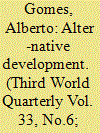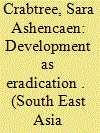| Srl | Item |
| 1 |
ID:
123514


|
|
|
|
|
| Publication |
2012.
|
| Summary/Abstract |
The goal of this article is to outline an indigenous form of social ecology offered as an alternative development model. Based on the normative system of the Orang Asli (Malaysian Aborigines), this model is characterised by various social, cultural and ecological ideas and practices undergirding the interconnected conditions of equality, sustainability and peace, which engenders a better life for all within the community. I contend that this model will provide lessons on how we might develop a normative paradigm to serve as an alternative to the current ecological and socially unsustainable mainstream and neoliberal development policy and practice, obsessed with the attainment of economic growth and greater market integration.
|
|
|
|
|
|
|
|
|
|
|
|
|
|
|
|
| 2 |
ID:
083622


|
|
|
|
|
| Publication |
2008.
|
| Summary/Abstract |
Abstract: In 2001, two indigenous Orang Asli communities living in Peninsula Malaysia were forced to leave their homelands to make way for the Sungai Selangor dam. The dam, built to resolve water shortages in Kuala Lumpur, came with a comprehensive compensation package designed to alleviate the hardships faced by the displaced communities. This paper explores the discursive and material impacts of these compensation packages. We argue that the emerging literature on compensation for displaced people values the same sorts of economic and social criteria as the Malaysian government does in its pursuit of modernising the Orang Asli. Their shared belief that effective compensation would improve the quality of life for affected communities above pre-displacement levels helped to publicly legitimise the dam-building project. Interviews with the displaced communities, however, found stark differences in community satisfaction which have more to do with losses of intrinsic place-based cultural and spiritual values, for which there may be no effective or adequate compensation, than social and economic criteria. We conclude that compensation programmes will always struggle to effectively cope with these less tangible place-based values and that open acknowledgement of this weakness is required if alternatives to displacement-inducing development projects are to be more readily considered
|
|
|
|
|
|
|
|
|
|
|
|
|
|
|
|
| 3 |
ID:
084424


|
|
|
|
|
| Publication |
2008.
|
| Summary/Abstract |
Abstract: In 2001, two indigenous Orang Asli communities living in Peninsula Malaysia were forced to leave their homelands to make way for the Sungai Selangor dam. The dam, built to resolve water shortages in Kuala Lumpur, came with a comprehensive compensation package designed to alleviate the hardships faced by the displaced communities. This paper explores the discursive and material impacts of these compensation packages. We argue that the emerging literature on compensation for displaced people values the same sorts of economic and social criteria as the Malaysian government does in its pursuit of modernising the Orang Asli. Their shared belief that effective compensation would improve the quality of life for affected communities above pre-displacement levels helped to publicly legitimise the dam-building project. Interviews with the displaced communities, however, found stark differences in community satisfaction which have more to do with losses of intrinsic place-based cultural and spiritual values, for which there may be no effective or adequate compensation, than social and economic criteria. We conclude that compensation programmes will always struggle to effectively cope with these less tangible place-based values and that open acknowledgement of this weakness is required if alternatives to displacement-inducing development projects are to be more readily considered.
|
|
|
|
|
|
|
|
|
|
|
|
|
|
|
|
| 4 |
ID:
161647


|
|
|
|
|
| Summary/Abstract |
The political rhetoric of social and economic development in Malaysia is used as a dominant and largely unquestioned discourse to justify the industrialized exploitation of the traditional territories of the indigenous people of West Malaysia. This article explores social policy drivers in respect of findings from a condensed ethnography of the Jakun Orang Asli people of Tasik Chini in the State of Pahang. Tasik Chini provides an important example of a wider problem affecting many Orang Asli communities in Malaysia relating to industrial exploitation, but is a case of special interest in respect of its significance as a site of rich and unique biodiversity, as well as being home to one of only two freshwater lakes in West Malaysia. Notably, Tasik Chini is also a UNESCO Biosphere Reserve, of which there are only two in Malaysia. The lake and surrounding forests have provided the Jakun villagers with abundant natural resources for subsistence, but now the area is badly eroded and polluted by the ravages of big business. This presents a serious dilemma for the Jakun concerning whether to resist the destruction of their traditional way of life or to comply with state agendas and collude with their loss of self-sufficiency and autonomy. As such, the situation in Tasik Chini raises important questions regarding national social policy drivers and the position and welfare of indigenous people in Malaysia.
|
|
|
|
|
|
|
|
|
|
|
|
|
|
|
|